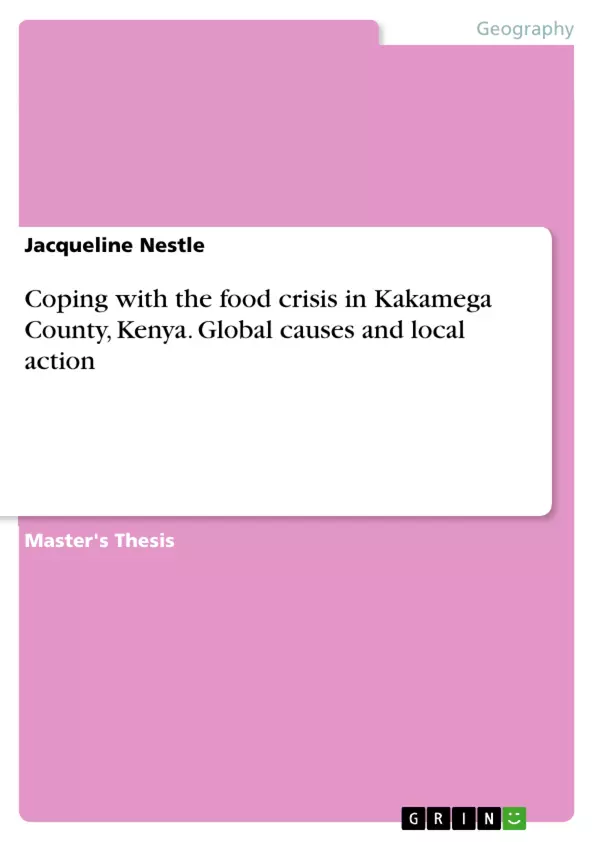When following the news and scientific publications over the years it became evident that humanity faces an increasing number of global crises that affect many regions all over the world. The objective of this master thesis is to examine: ‘What constitutes the food crisis in Kakamega County, Kenya?’. Climate change, the ongoing Russia-Ukraine war, and the COVID-19 pandemic were the main global crises considered in the research in this thesis. The data were collected during a three-week research stay in Kakamega County, which was supported by the German NGO Welthungerhilfe. Kakamega County in Western Kenya is of particular interest because it is part of the so-called ‘food basket’ of Kenya which is considered to be the fertile region of the country. The main method was set on interviews with different actors in the local food system. These revealed the current state of food security in Kakamega County, the factors influencing it and the different coping strategies. For the interpretation of the results the main concept of food security was applied: It examines the food availability, access to food, its utilization and stability. The conceptual work was completed with the critical view of political ecology and vulnerability approaches.
Inhaltsverzeichnis (Table of Contents)
- Introduction
- Geographical setting of the research area
- Kenya - Food security in the context of global crises
- Regional vulnerability context of the research area Kakamega County
- Theoretical framework
- Political Ecology - framing of the topic
- Food Security
- Linking political ecology and food security to vulnerability
- Methodology
- Research design and data generation
- Data analysis
- Reflection on applied methods: Positionality and limitations
- Results - global causes and local action
- Research area
- Current situation of food security in Kakamega County
- Causes for food insecurity
- Local action against the food insecurity
- Future perspectives on food security in Kakamega County
- Discussion - a county between exposure and coping
- The food basket of Kenya - a food insecure region?
- Global crises the main driver for local food insecurity?
- Coping mechanisms and their sustainability
- What constitutes the food crisis in Kakamega County?
Zielsetzung und Themenschwerpunkte (Objectives and Key Themes)
This master thesis aims to investigate the factors contributing to the food crisis in Kakamega County, Kenya, focusing on the impacts of global events like climate change, the Russia-Ukraine war, and the COVID-19 pandemic. The research employs a qualitative approach, utilizing interviews with local actors in the food system to understand their experiences and coping strategies.
- Food Security in Kakamega County
- Impact of Global Crises on Local Food Systems
- Vulnerability and Resilience in the Context of Food Insecurity
- Coping Mechanisms and Local Action
- Interconnections between Global and Local Food Systems
Zusammenfassung der Kapitel (Chapter Summaries)
- Chapter 1: Provides an introduction to the research topic, outlining the objectives and scope of the study.
- Chapter 2: Describes the geographical setting of Kakamega County, highlighting its importance as part of Kenya's "food basket" and analyzing the regional context of vulnerability.
- Chapter 3: Presents the theoretical framework of the study, exploring the concepts of political ecology, food security, and vulnerability.
- Chapter 4: Details the research methodology employed, including data collection methods, data analysis techniques, and reflections on positionality and limitations.
- Chapter 5: Presents the research findings, examining the current state of food security in Kakamega County, identifying the causes of food insecurity, and exploring local actions taken to address it.
- Chapter 6: Discusses the research findings in detail, exploring the relationship between global and local factors influencing food insecurity, analyzing coping mechanisms, and considering the sustainability of these strategies.
Schlüsselwörter (Keywords)
The primary keywords and focus topics of this study include: food security, food insecurity, Kakamega County, Kenya, global crises, climate change, Russia-Ukraine war, COVID-19 pandemic, political ecology, vulnerability, coping mechanisms, local action, food systems, qualitative research, interviews.
- Quote paper
- Jacqueline Nestle (Author), 2023, Coping with the food crisis in Kakamega County, Kenya. Global causes and local action, Munich, GRIN Verlag, https://www.grin.com/document/1452613



